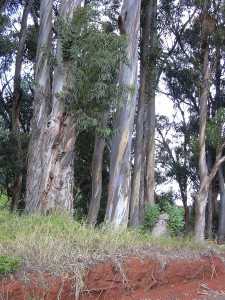The Tasmanian blue gum, southern blue gum or blue gum (Eucalyptus globulus) is an evergreen tree, one of the most widely cultivated trees native to Australia.
Contents
Uses
- The leaves are steam distilled to extract eucalyptus oil. E. globulus is the primary source of global eucalyptus oil production, with China being the largest commercial producer.]
- The oil has therapeutic, perfumery, flavoring, antimicrobial and biopesticide properties. Oil yield ranges from 1.0-2.4% (fresh weight), with cineole being the major isolate. E. globulus oil has established itself internationally because it is virtually phellandrene free, a necessary characteristic for internal pharmaceutical use.
- In 1870, Cloez, identified and ascribed the name “eucalyptol” — now more often called cineole — to the dominant portion of E. globulus oil.
- Tea from Eucalyptus gloculus helps with respiration and cold treatment.
Benefits
- Eucalyptus leaf is used for infections, fever, upset stomach, and to help loosen coughs. The leaf is also used for treating respiratory tract infections, whooping cough, asthma, pulmonary tuberculosis, osteoarthritis, joint pain (rheumatism), acne, wounds, poorly healing ulcers, burns, bacterial dysentery, ringworms, liver and gallbladder problems, loss of appetite, and cancer.
- Eucalyptus oil should not be taken by mouth or applied to the skin full-strength. It must be diluted for safety. The diluted oil is taken by mouth for pain and swelling (inflammation) of respiratory tract mucous membranes, coughs, bronchitis, sinus pain and inflammation, asthma, chronic obstructive pulmonary disease (COPD), and respiratory infections. It is also used as an expectorant to loosen coughs, antiseptic, fever reducer, and in vaporizer fluids. Other uses include treatment of wounds, burns, ulcers, and cancer.
- Diluted eucalyptus oil is applied directly to the skin for pain and swelling of respiratory tract mucous membranes, joint pain, genital herpes, and nasal stuffiness. It is also used as an insect repellent.
- In dentistry, eucalyptus oil is included in products used as sealers and solvents for root canal fillings.
- In foods, dried eucalyptus leaf is used as a flavoring agent.
- In manufacturing, eucalyptus oil is used as a fragrance in perfumes and cosmetics. It is also used as a mouthwash, antiseptic, liniment and ointment, and in toothpaste, cough drops, and lozenges.
Cautions
- Please consult your doctor about side effects coming from Eucalyptus gloculus
Interactions
- None are recorded.
Other names
Blue Gum, Blue Mallee, Blue Mallee Oil, Eucalipto, Eucalypti Folium, Eucalyptol, Eucalyptol Oil, Eucalyptus blatter, Eucalyptus bicostata, Eucalyptus Essential Oil, Eucalyptus Oil, Eucalyptus fructicetorum, Eucalyptus globulus, Eucalyptus Leaf, Eucalyptus odorata, Eucalyptus Oil, Eucalyptus polybractea, Eucalyptus smithii, Fever Tree, Fieberbaumblatter, Gully Gum, Gully Gum Oil, Gum Tree, Huile Essentielle d’Eucalyptus, Huile d’Eucalyptol, Huile d’Eucalyptus, Red Gum, Stringy Bark Tree, Sugandhapatra, Tailapatra, Tasmanian Blue Gum
References
Source: WebMD, http://www.webmd.com/vitamins-supplements/ingredientmono-700-EUCALYPTUS.aspx?activeIngredientId=700&activeIngredientName=EUCALYPTUS
Wikipedia, https://en.wikipedia.org/wiki/Eucalyptus_globulus#Uses

